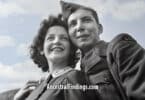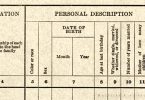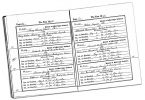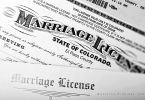Marriage records are considered one of the Top Three “basic” genealogical records. These are the records every beginning genealogist should start out using and the ones they will turn to again and again as they become experienced genealogists and discover even more ancestors. The Top Three are Birth, Death, and Marriage. These comprise the basic records of vital statistics that tell the main information anyone wants to know about their ancestors. Of course, as an experienced genealogist, you will want to research more and discover the stories of the lives of your ancestors, the details behind the dates and names. However, you still must start with the basics. Here are the top six most frequently asked questions about marriage records, and how they are used in genealogy.
What information will you find on marriage records?
There is a surprising amount of information on marriage records, depending on where they were generated. Just like any genealogical records, some places recorded more information on a record than others. At a minimum, you will find the names of the bride and the groom, as well as the towns where they live, and the date of the marriage. Depending on the location that generated the marriage record, you may also find the ages of the bride and groom, whether it is a first or subsequent marriage for each, and the names (and sometimes occupations) of their parents. The first name of the mothers of the bride and groom, if parents’ names are included, will be there at a minimum; better records will give the maiden name of the mother, as well. This type of information makes marriage records an excellent source of details to use to jump off to find additional information on an ancestor and/or their family line going back generations.
Why do you need marriage records?
Besides the aforementioned information included on the records that allows you to jump off even farther into the genealogical past, you can also use marriage records to prove a union. This is most typically done for joining lineage societies, where you must have documentation to prove every birth, death, and marriage in each generation listed on your application. If you are writing a genealogical piece or narrative for a publication, you will need sources to cite, and the marriage record is a perfect primary source to use. It is a primary source because the information given on it was provided by the actual bride and/or groom, so it can be considered more reliable than a death record, which has information on it provided by someone other than the person it documents. The only other record type more reliable (or equally reliable) than a marriage record is a birth record. Of course, checking other records to verify things such as names, birthplaces, parents, and ages is a good idea, in case the bride or groom lied. Why would they lie? Well, as an example, I have the marriage record for one of my great-aunts, which states she was 16 at the time of her marriage in Delaware in 1930. However, I know from her birth record that she was actually 14 when she got married. Her daughter filled in the reason for the discrepancy for me, when she told me my great-aunt and her 21-year-old husband eloped and said she was 16 because that was the age of consent at the time. Fortunately, her parents accepted the marriage, after some initial upset, and six children were born from the union.
Where will you find marriage records?
You will generally find them at county courthouses, especially very old ones. These are almost always held at the county level. Newer ones are held by the state department of vital records in the state where the marriage occurred. You may also find a commemorative marriage certificate or a copy of the marriage license among a recent relative’s belongings. If you don’t know the county or state of the marriage, search the one you think it may be, as well as the surrounding ones to have a better chance of locating it. Also, look at marriage “destination” locations that were popular at the time.
What hidden information may be useful on a marriage record?
You can find the name of the minister or priest who married the couple. The name and location of the church or courthouse where they were married may also be on there. In addition, you may find the names of witnesses to the marriage. All of these things are often overlooked by genealogists who are just beginning but can actually provide more avenues for research. You can look up information on the person who married them to get an idea of the couple’s religion. Looking up church records where they got married may give you other records regarding your ancestors. Witnesses were often family or close friends. Looking up records on them may also reveal more information about your ancestors that you will love.
What can you use as marriage record substitutes?
Sometimes, there is no traditional marriage record, because the area where your ancestors got married did not require them at the time, or the courthouse where they were stored was destroyed by fire or other natural disasters (like flood or earthquake). You can look for substitutes, such as the posting of banns. a colonial tradition announcing a couple’s intention to marry on a certain date. Look for notations of a marriage in parish registers for 15th-17th-century marriages in Europe. You can also use the 1900 U.S. census to get an approximate date of marriage, as it tells how long a couple has been married, and whether it is their first, second, or another number of marriage. Announcements of marriages in old newspapers are also good sources for marriage information.
What can you do if a marriage record is unavailable?
Every now and then, a marriage record exists but is unavailable due to local restrictions on record access. New York state is an excellent example of this, as it keeps both marriages (50-years) and divorce records (100-years) sealed after the event, even to the children of the couple, and even if both people in the couple are deceased. It has some of the most restrictive marriage record laws in the country, but other places make it less easy to get a marriage record than others. If you really need it for your research or lineage society application, you can get a lawyer to request a judge overseeing those records to order them unsealed for you. You must have a very good reason for making such a request. If you do and are willing to spend a little money, you can usually get the record.






